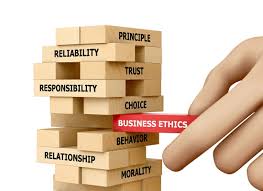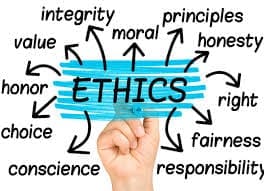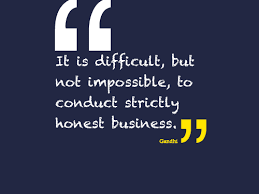“If ethics are poor at the top, that behavior is copied down through the organization”
The word ethics is extracted from the Greek word Ethicos meaning human character is the essence of values of a person. It includes perusal of concepts like what is right or wrong, good or evil, and acting in a responsible manner.
Usually, people do not consider any difference between Ethics and Morals but there exists a thin line of distinction between the two terms. The word Moral has been derived from a Latin word ‘Mos’ meaning the customs whereas Ethics has been derived from the Greek word ‘Ethicos’ meaning character. Morals is accepted from an authority like culture, religion, customs whereas Ethics are accepted because they follow from personally accepted principles.
Business Ethics also known as corporate ethics is a form of professional ethics that states the ethical principles, morals, rules, and regulations to be followed in a business environment. Legal systems often guide business ethics but these ethics provide a guideline that businesses should follow to achieve the organizational as well as social goals. Compliance of Business Ethics ensures a basic level of trust between the consumers and stakeholders.
Source of Ethical Standards
It is always a dilemma that ethics is not the same as feelings, religion, law, socially accepted culture, or Science, then what are the ethics based on? There are some suggested sources of ethical standards one should use.
- Utilitarian Approach – According to this approach some ethicists highlighted action that provides the best and least harm. Business ethical action should be the one that provides the greatest good and does the least harm to the stakeholders of the company. Its approach to exercise that action should produce the greatest balance of good over harm.
- Right Approach – As per this approach philosopher said that an action that best protects and respect the moral rights of the person is an ethical one. The right approach affirms that humans have dignity based on their nature and have the ability to choose what they do with their lives.
- Fairness or Justice Approach – According to the Greek philosophers, the ethical approach is the one in which all equals are treated equally. In the current business scenario, ethical actions are those which treat humans fairly and equally based on some standard that is defensible. Business Ethical action would be the one which treats all same level employees equally and grade them as per their hard work and contribution to an organization. Favoritism only benefits some people and discrimination directly affects the motivation and a passion of employees to work and both the actions are wrong.
- Common Good Approach– expresses a notion that society comprises of individuals whose actions are inseparably linked to the community. Therefore it is the responsibility of every community member to be bound by the pursuit of common values and goals. Business environment also every member of the business community is interlinked with each other and therefore it is the moral duty of every member to work for the common goals. In a Business organization, actions of the top-level management directly affect stakeholders, and action of employees directly affect the organization and the business.
- Virtue approach – This approach assumes that there are certain ideals provided for the
 full development of humanity. These virtues are habits that enable a person to work according to the highest potential of his character. Examples of virtues are compassion, honesty, courage, tolerance, love, fairness, integrity, self- control, and prudence. Ethics are like habits which once acquired become human characteristics.
full development of humanity. These virtues are habits that enable a person to work according to the highest potential of his character. Examples of virtues are compassion, honesty, courage, tolerance, love, fairness, integrity, self- control, and prudence. Ethics are like habits which once acquired become human characteristics.
Need For Business Ethics
As it is rightly said by the father of the nation Mahatma Gandhi, “Trusteeship provides a means of transforming the present capitalist order of society into an egalitarian one”. According to him, a businessman is a trustee of society for whatever he has gained from society. Ultimately everything belongs to society. Society grants authority to own and use natural resources to the businessman. As a result, society has the right to expect that organization will magnify the returns for the society (employees, consumers, shareholders, suppliers, government, and environment). Hence, Business Ethics is a set of principles that govern the code of conduct of business to work for the enhancement of the general interest of organizations and stakeholders.
Benefits of Business Ethics
- Survival and Growth of business units – Every business unit to survive and grow it is important to bestow the fair results to the society. A business cannot run and grow in such a manner that is detrimental to the interest of society of business itself. Therefore, Business ethics is crucial for every organization to grow and survive.
- Enhancement of goodwill – An organization that pays attention to its business ethics can reflect a positive image to the public. People see such organizations that value people more than profits and strive to work with integrity and honesty.
- Maintaining Inter-relationships– No business unit can work in isolation. Each business has a close relationship with another business and the society where actions of one business unit are inseparable with results for the society as a whole. Ethical behavior ensures that is business unit has a smooth relationship with others.
- Strong teamwork and creative productivity – Strong recommendation for the values in the workplace build integrity, fairness, openness, and equality in the workplace which are the key ingredients of strong teams. A business organization working as a team towards the achievement of a common goal with having greater efficiency, productivity, growth, and success.
- Enhance employee confidence – Attention towards ethics promotes the employees to face bad and good situations in the organization and gain the confidence of dealing with complex work situations. An organization which sticks to the business ethics also gain the employee confidence and trust where the employee is sure about the fair and equal treatment without favoritism and discrimination.

Thus, managing ethics along with optimizing profit generation validate the managerial actions, strengthens the relationship within and outside the organization, balance the organization’s culture, and supports greater consistency in standards and quality of products. Last but not the least a proper attention to the business ethics set a direction for a business organization to take business growth and social welfare hand in hand.
Article Written By
Naina Rupani, Management Trainee- TVC
FOSTIIMA Business School
navyarupani09@gmail.com

